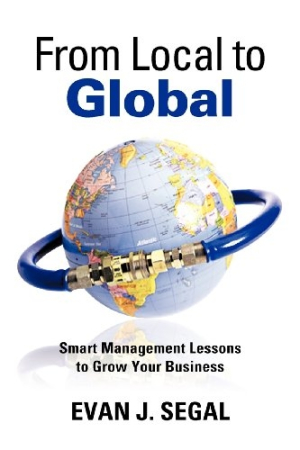From Local to Global
Smart Management Lessons to Grow Your Business
From Local to Global: Smart Management Lessons to Grow Your Business treads a path that is similar to other how-to management books in its discussion of the basics, such as new product development, human resources, marketing, customer relations, and supply-chain management.
The distinguishing factor, however, is that Evan Segal’s book tells the story of his own company, Dormont Manufacturing, a business-to-business firm that grew from a small family-owned company to a global manufacturing organization. As such, readers can gain a true understanding of how an industrial company’s growth influenced the way in which Segal and his management team had to adapt to change.
Each of ten brief chapters covers a separate topic, including two directly related to global growth (“International Partnerships” and “International Market Access”). The “Lessons Learned” section at the end of every chapter serves up the author’s insights, many of which may be helpful to managers faced with similar situations. For example, concerning international partnerships, Segal writes, “It may be critical to have an in-country business partner in overseas markets to help fight trade barriers designed to protect local manufacturers.” He expands on these thoughts with kernels of advice based on his own experience.
One of the most useful chapters in the book is likely to be the last one, “Selling the Business.” Here, Segal describes some of the important factors that led up to his decision to sell Dormont. He makes an interesting point that may be an eye-opener to some small business owners: One of the reasons he wanted to sell the company was to be more financially diversified. Segal had plowed most of his assets back into the company. “A sale,” writes Segal, “would provide the liquidity to create a more balanced, diversified portfolio that would not have the high concentrated risks associated with being invested in one entity.”
The author shares, in specific detail, how he built an advisory team and selected an investment bank. He also describes the phases of the sales process he went through to sell the business. Segal discusses how selling fees are structured and includes example fees, which are seldom revealed in business books. He offers an anecdote describing the poor manner in which a larger investment bank treated his company—a story that is likely to reinforce what small business owners already believe about big banks.
In the end, the reader may take issue with the book’s title. From Local to Global is less about making the leap “from local to global” than it is a case study that presents the general aspects of managing a growing company. But most small business owners, particularly those who run manufacturing firms, should find Evan Segal’s lessons very applicable to their own management challenges, regardless of their interest in going global.
Reviewed by
Barry Silverstein
Disclosure: This article is not an endorsement, but a review. The publisher of this book provided free copies of the book and paid a small fee to have their book reviewed by a professional reviewer. Foreword Reviews and Clarion Reviews make no guarantee that the publisher will receive a positive review. Foreword Magazine, Inc. is disclosing this in accordance with the Federal Trade Commission’s 16 CFR, Part 255.

